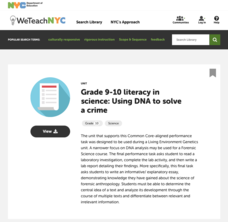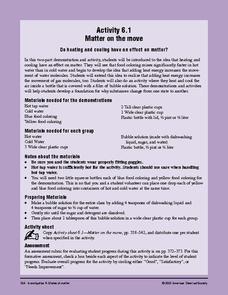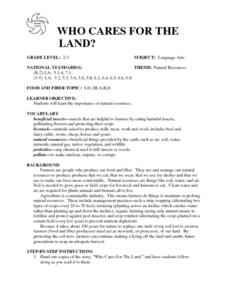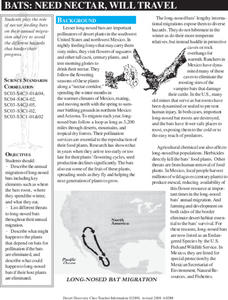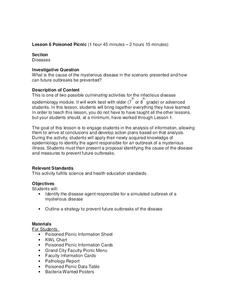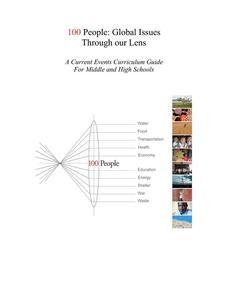New York City Department of Education
Grade 9-10 Literacy in Science: Using DNA to Solve a Crime
Scholars become detectives and use science to solve a crime! A complete unit introduces DNA and includes hands-on activities that have learners model DNA and extract it from different food types. A culminating activity challenges...
Beyond Benign
Ecological Footprint
How does your lifestyle measure up in terms of your ecological footprint? Young ecologists examine their impact on the planet using an insightful online calculator. A short quiz asks users to rank the size of their homes, their energy...
Macmillan Education
Cultural Awareness
The importance of cultural awareness, of becoming aware of our own and other cultures, and the benefits of gaining a deeper understanding of the differences between cultures, is the focus of this resource. Working individually, in pairs,...
American Chemical Society
Matter on the Move
Start this mini unit on matter out by demonstrating how food coloring behaves when placed in cold and in hot water. Then have the class experiment with warm water and soap film. Pupils will learn that an increase in thermal energy also...
Curated OER
Who Cares for the Land?
A very thorough lesson plan focuses on what plants need to grow and stay healthy. There are excellent reading activities and worksheets included in this fine plan. A terrific way to introduce a unit on plants and their needs.
Curated OER
Bats: Need Nectar, Will Travel
Beginning wildlife biologists become adult bats, baby bats, snakes, owls, bobcats, or land-clearing developers in a grand role-playing activity. In a large open space, they play a game in which they move to designated areas based on what...
Centers for Disease Control and Prevention
Poisoned Picnic
A group of teachers attended a picnic; ten became sick and another four died. Young scholars must solve the mystery of what happened. They research the river, waste water treatment plant, each food that was served, and environmental...
Virginia Department of Education
Cell Parts
What do a bird, an egg, a rabbit, and a toad all have in common? This fun-filled resource explains the similarities and differences between cells and how all cells are similar, yet all are different. Learners begin by depicting a...
Curated OER
Regents High School Examination: Living Environment 2009
Emerging ecologists need a full understanding of life, from the inner workings of a cell to the complex relationships among organisms. This examination is meant to assess high schoolers after an entire year course on the living...
Curated OER
Regents High School Examination: Living Environment 2007
Environmental science enthusiasts show what they know at the end of the year by taking this full-fledged final exam. They answer multiple choice, graph interpretation, and essay analysys questions, 73 of them in all. Topics range from...
NOAA
Biological Oceanographic Investigations – What's in That Cake?
Have you ever tried to find hidden items in a picture when you don't know what you are looking for or how many things are hidden? A lesson applies that same concept to sampling the deep sea habitats. Participants must first create a...
Columbus City Schools
ABC: Acid Base Chemistry
Bubble, bubble, boil and trouble! What causes common substances like baking soda and vinegar to react the way they do? Welcome your junior chemists to the wonders of acid-base chemistry using a comprehensive and fun resource. Engage them...
100 People Foundation
100 People: Global Issues Through Our Lens
If the world were 100 people...17 would not have access to safe drinking water, 18 would not be able to read or write, and 52 would not have a primary education. Using the theme of "100 people," this resource explores other major issues...
PBS
Making Change: Revolutionary Tactics of the Civil Rights Movement
The film American Revolutionary: The Evolution of Grace Lee Boggs introduces viewers to the differing philosophies of and strategies employed by 1960s civil rights leaders such as Malcolm X and Martin Luther King, Jr. and the debate over...
Curated OER
Steps to a Healthier You
Students explore the food pyramid. In this dietary health lesson plan, students examine the food pyramid on the MyPyramid.gov website and discuss healthy eating strategies. There are various links to websites in this lesson plan.
Curated OER
Eating Patterns
Students sort through pictures of food to create patterns as they pertain to geometry. In this geometric patterns lesson, students relate to food as concrete objects that represent geometric patterns. Students recognize and describe the...
Curated OER
Food: Early American Food Cycles Web Quest
Young scholars complete a Web Quest on ways that Native Americans hunted for, harvested, stored, and prepared food and what types of natural foods were eaten. In this early American food cycles lesson, students discover many of the ways...
Curated OER
Heart Healthy Food Musical Chairs
Students participate in a game of musical chairs that discusses heart health. In this health lesson, students walk around a group of chairs and when the music stops they sit down. Some chairs will have index cards with a picture of a...
Curated OER
Food from the Community
Third graders examine the role of cultural style of food in various communities. In this cultural factors lesson, 3rd graders look at how foods are eaten raw or processed in various communities. Students design collages using...
Curated OER
Getting the Most Nutrition from Your Food
Sixth graders explore human health by participating in a nutrition activity. In this food choices lesson, 6th graders review the food pyramid in class and identify the specific classifications of food that create positive health for...
Curated OER
International Food
Students creatively develop a project dealing with a country of their choice. They gain knowledge of other cultures through research. Students develop an essence of food customs and traditions of the country of their choice. They design...
Curated OER
You Need How Much Food When? Where?
Ninth graders explore how human activities shape the earth's surface. In this awareness lesson, 9th graders create pictographs showing the relations of food, people, land, and resources. Students complete worksheet.
Curated OER
Favorite Foods
Pupils explore human health by reading agricultural books. In this dietary habit instructional activity, students discuss the foods we eat everyday and read two books about our human diets. Pupils identify the uses our body has for food...
Curated OER
Happy Food Song
Students learn a song. In this food lesson, students learn the Happy Food Song. Students are given a food model and identify their food. Students sing the song with motions.


